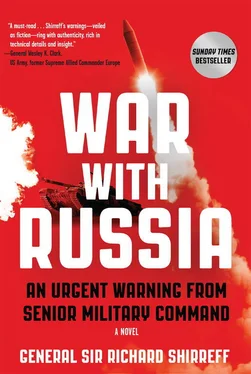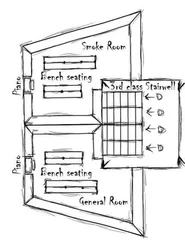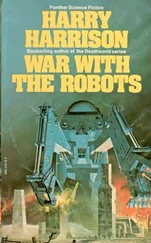Dillon nodded, but did not react. Instead, she sat back in her chair at the head of the table and took time out to think and study her notes.
Nobody said a word.
Then she looked MacWhite in the eye. “Abe, we can do this and we must do this. Europe’s defense and security is America’s defense and security. We have taken too much risk and made too many assumptions about the world being a safer place just because it is a smaller place… and we’ve all been caught out. Now we’ve just got to do what needs to be done and let me be crystal clear,” and her voice hardened. “If the Russians go nuclear, even with a tactical nuclear weapon, I’ll have no hesitation in retaliating with ICBMs. So make sure that message is communicated loud and clear on every diplomatic channel. This is one issue we, and the world, cannot afford to have the Russians make any miscalculations about.”
She paused to let the implication of this message sink in then, voice softening slightly, she continued, “Our allies in the Baltic states, freedom-loving, democratic countries, must be freed from Russian occupation and we’ll do it. But, as you say, Abe, we’ll do it cleverly. Now, Pete,” she caught Chiarini’s eye. “Set up a cabinet meeting today so that we can take this forward and then let’s get working those phones. I want to start by reassuring London that America is up for the fight.”
1500 hours, Tuesday, June 6, 2017
NATO Headquarters, Brussels, Belgium
THE NORMAL BUSTLE and chatter of diplomats, military staff officers and note takers milling about before an NAC, North Atlantic Council, meeting was absent as McKinlay took his seat next to SACEUR in the conference room at NATO’s Brussels headquarters. A deep sense of despondency hung over the room as Radek Kostilek, the Secretary General of NATO, walked swiftly into the chamber and sat down at the large round table at which the twenty-eight ambassadors of the member states were placed in alphabetical order, behind their name plates and individual national flags. NATO’s failure to deter the Russian invasion of the Baltic states, the heavy casualties suffered by the US Air Force detachment at Lielvārde air base, the sinking of the two mine countermeasures vessels in Riga and, most catastrophic of all, the torpedoing of HMS Queen Elizabeth , had rocked the Western Alliance to its very foundations.
This had been a massive failure by the Alliance; a disaster unprecedented in the history of NATO and the military, political, social and economic consequences were at last sinking in, even in the countries most hostile to overt military action. The frontiers, as well as the balance of power in Europe, were about to change yet again and this time, unlike the end of the Cold War, the democratic West was going to be the clear loser.
Kostilek had confided to Howard and McKinlay before the meeting that he feared the Alliance was on the brink of collapse as a result. Whether NATO was to survive depended on how it reacted to these blows. He had to set the right tone from the start of the meeting, otherwise the naysayers would take control.
“Ladies and gentlemen!” Kostilek’s voice, his Polish accent accentuated by emotion, was commanding. “Please stand. We will first hold a minute of silence in memory of the many NATO soldiers and sailors who have only recently given their lives in defense of freedom.”
McKinlay pulled himself to his feet, as did everyone else around the table. As they stood in silence, the flags of member states that had suffered casualties were projected onto screens around the conference table in alphabetical order: Estonia, Germany, Latvia, Lithuania, United Kingdom, United States of America.
Then Kostilek sat down and addressed the Council. “Ladies and gentlemen, the Alliance has suffered grievous blows in recent days as the result of naked Russian aggression against the Baltic states. While we are united in honoring our fallen comrades and in condemnation of Russia, we must also be under no illusions. The purpose of the Alliance since its foundation in 1949 has been collective defense, the rock on which it has been built for sixty-eight years. And yet, when the crisis came, collective defense meant nothing. The Alliance failed. You need no reminding that NATO is no more or less than the nations which make up the Alliance… That means the nations have failed.” He paused and looked slowly around the table, making it clear where he thought the responsibility for failure lay.
Point forcefully made, he resumed. “Let me take you back to the Cold War. Yes, there were fewer member states back then. But our predecessors around this table understood that collective defense needs more than words. That words alone, unless backed by genuinely capable, strong defenses, mean nothing to our enemies. What a contrast to where we are today! The Alliance has spoken loudly, has puffed up its capabilities, but has completely failed to deter Russia. Would Russia have dared to attack strong, resolute, well-equipped and truly ready armed forces… ? I say NO!” He spat out the word.
For a moment there were mutterings of disagreement and annoyance from around the table, exactly as Kostilek had predicted. NATO had faced the massed armies and aggression of the Warsaw Pact for forty years of the Cold War, but peace had prevailed. Why? Because the Warsaw Pact knew that NATO was ready and able to respond. Today’s member states knew this. Hence the looks of shame, of guilt even, on the faces of some ambassadors at his words. It was this, Kostilek had explained to Howard and McKinlay earlier, that he would tap into when he spoke.
He banged the table with his hand and the room fell silent.
“And be under no illusions. The proof is that our brothers and sisters in Estonia, Latvia and Lithuania are now occupied by Russia and the President has decreed that they are to be incorporated into his empire of fear and terror.”
For a moment he softened his tone. “Ambassadors of those countries, dear friends and colleagues, I extend our deepest sympathy… but rest assured,” again he struck the table to emphasize the point and his eyes flashed defiance. “I speak for every nation in the Alliance when I say that we will not rest until you have regained your liberty.”
Kostilek stopped and again looked every ambassador in the eye. As a Pole, he understood far better than those from Western Europe the reality of life as part of the Russian Empire. Some looked down, but did not argue. Others looked back at him equally directly. Some even nodded their approval. The Secretary General had set the tone he was looking for.
He continued, “Dear colleagues all. NATO is an alliance of three-and-three-quarter million men and women under arms. We far outnumber the Russians in men and equipment and resources. United we are terrifying; unstoppable. United, we can put together the means, not only to liberate our dear friends in the Baltic states, but also to defend the freedom, democracy and the rule of law we all cherish… The alternative is too terrible to contemplate. Will you too fall under Russian control? Will you find yourselves the next country in front of this Council, begging for help? Picked off one by one at the President’s whim… Because, be under no illusions, that is what will happen next.”
And now, McKinlay saw, he really did have their attention. It was one thing for the Greeks to get loans from the Russians or on the international bond markets, but quite another to be informed that the interest on those loans now included the gift of a port for the Russian navy, or a base for their fighter aircraft. Even Greece could see that their independence was only possible because she was a vibrant democracy. Anybody who read a newspaper or watched a television had to be able to see that true democracy was anathema to the Russian President.
Читать дальше












